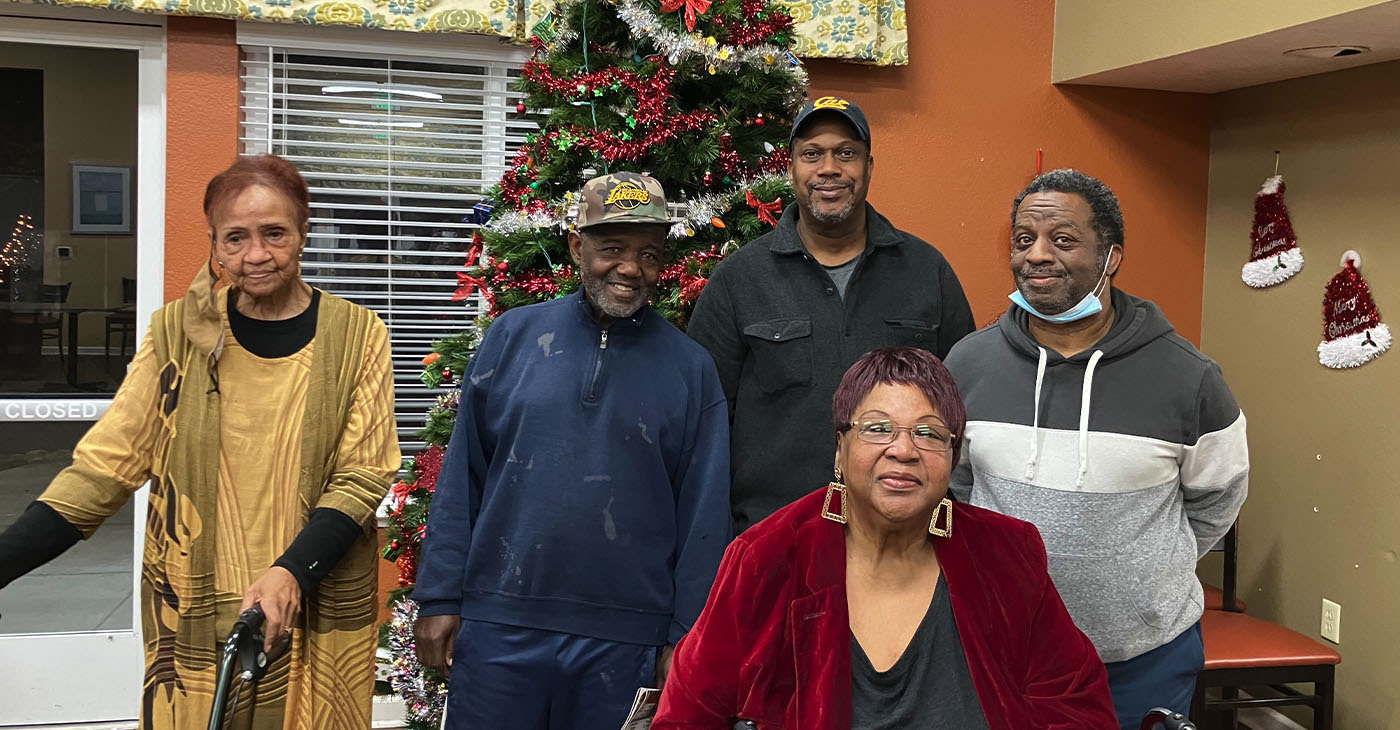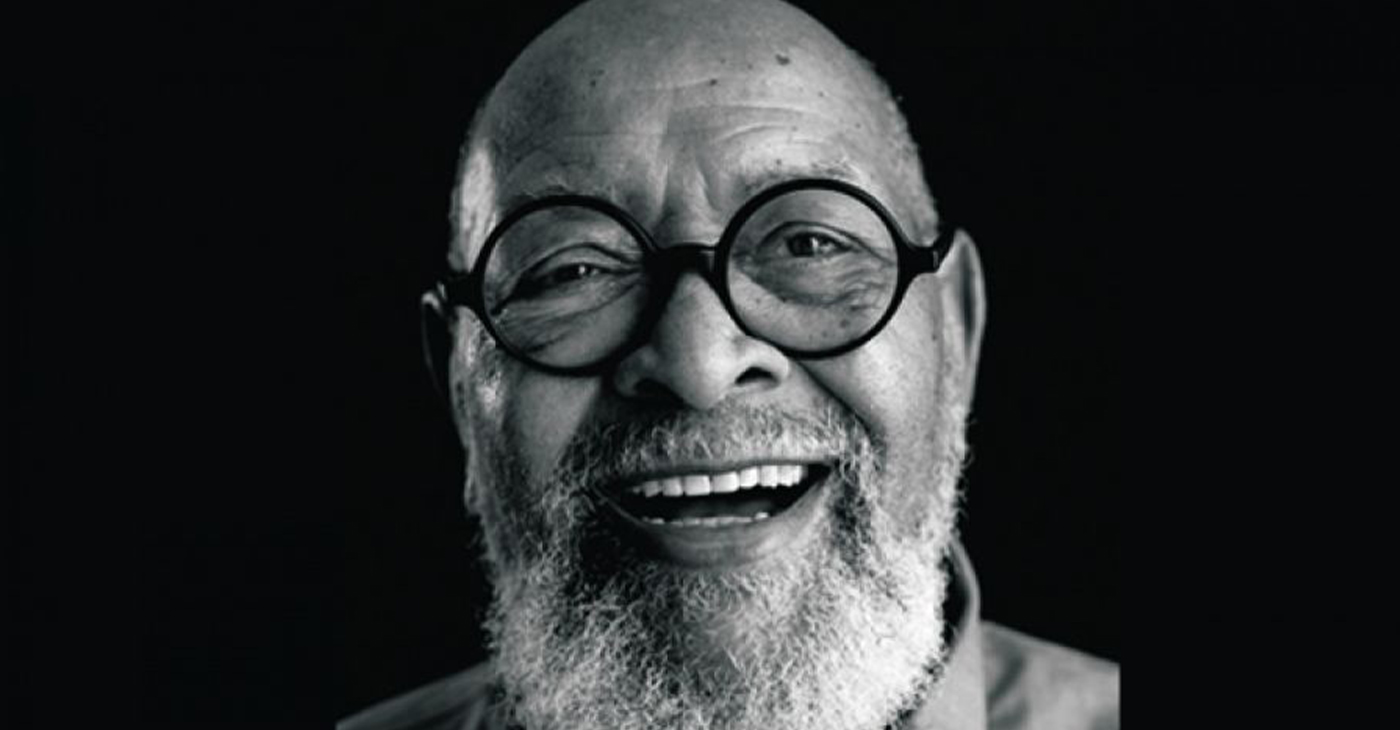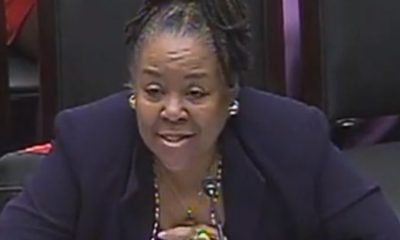Activism
Heritage Park Seniors Say Rent Hikes are Unaffordable, Garner Support from City
City officials have recently supported Heritage residents. During a city council meeting on Nov. 28, council members Cesar Zepeda and Melvin Willis asked staff to approve a letter asking USA Properties not to implement the 5% increase and to reevaluate future increases. The letter stated the increase could force residents “to sacrifice other needs to keep up with their housing cost” and possibly drive them to homelessness. The City Council unanimously agreed to send the letter, although USA Properties still raised the rents.

By Zack Haber
Some tenants at an affordable senior apartment facility in Richmond called Heritage Park at Hilltop have been speaking out against what they see as excessive rent increases. Low-income tenants like 72-year-old Elda Fontano worry that the 5% increase they received on Dec. 1 could price them out of the facility. The tenants have garnered support from city officials, who are questioning if 5% rent increases are affordable for Richmond seniors.
“This 5% increase is killing me and eventually it’s going to send me right out the door,” said Fontano.
Richmond Councilmember Melvin Wills said that conversations with tenants have shown him that many are already struggling with rent costs and that he thinks the goal for affordable housing facilities should be “stabilizing the community at hand.”
“I know that technically [Heritage] is considered affordable housing for the region,” Willis said. “But if you’re going to be increasing rents knowing that people can’t afford it and it’s just going to open up the space for someone who can, I identify that as a problem even if it is legal.”
Heritage, which opened in the year 2000 and has 192 housing units, is owned and operated by the Roseville based USA Properties Fund, inc. The company receives federal funding for the facility through the Low Income Housing Tax Credit program and has just over 100 apartment complexes operating or under construction. Most of them are affordable facilities, and about half of them are senior apartment facilities, like Heritage, for those ages 55 and older.
Rents at Heritage fall within what the state legally allows affordable housing providers to charge. The California Tax Credit Allocation Committee calculates and monitors maximum allowable rents for the low-income housing program. According to a spokesperson for USA Properties, the committee has set Heritage’s maximum allowable rent based on income levels of 60% of the area median income. These limits are $1,909 for two-bedroom apartments and $1,601 for one-bedroom apartments. The spokesperson said on average, Heritage tenants are charged $1,523 for two-bedroom apartments and $1,432 for one-bedroom apartments. Other than providing these figures, no one from USA Properties provided further comment or answered questions for this article.
The formula that the California Tax Credit Allocation Committee uses to calculate maximum rent costs at affordable senior facilities poses difficulties for Richmond residents. It’s based largely on area median income at the county level. But census data show that, on average, Richmond residents make less money than the rest of the county. While the average per capita income for all of Contra Costa County between 2018 and 2022 was around $59,000 per year, the average per capita income in Richmond during that time was around $39,500 per year. The formula doesn’t account for fluctuations in income throughout a county, so the committee allows companies to charge Richmond residents as much in rental costs as those living in wealthier towns like Lafayette, whose per capital income is around $111,000 per year.
The comparatively high costs of rent are straining Heritage residents like Fontano and her neighbor, 62-year-old Samuel Lewis. Both are on fixed incomes, can’t work because they have disabilities, and say they have trouble affording basic necessities like food. Fontano spends over half her monthly income on rent. Rent makes up over 70% of Lewis’s expenses.
City officials have recently supported Heritage residents. During a city council meeting on Nov. 28, council members Cesar Zepeda and Melvin Willis asked staff to approve a letter asking USA Properties not to implement the 5% increase and to reevaluate future increases. The letter stated the increase could force residents “to sacrifice other needs to keep up with their housing cost” and possibly drive them to homelessness. The City Council unanimously agreed to send the letter, although USA Properties still raised the rents.
Complaints about affordability are not new at Heritage. According to a city report, around 30 Heritage tenants expressed concerns to Richmond’s Rent Board and City Council shortly after receiving word that their rent would increase much as 12% in March of 2018. Some tenants said they feared they would be left homeless or “unable to buy medication or enough food.” In response to their concerns, the City Council passed a resolution in June of 2018 that stated it was “in the best interest of the city” to take a stand against the rent increases at the facility. According to Willis, who also is an organizer with the grassroots housing justice group Alliance of Californias for Community Empowerment, tenants organized through that group to push back against the 12% increase. USA Properties agreed to lower the increases to 3%.
In February of 2019, the Richmond Rent Board adopted a resolution capping rent increases at Heritage at no more 5% a year. The resolution also covered all of the approximately 30 other housing facilities in Richmond that receive Low Income Housing Tax Credit funds. USA Properties increased Heritage tenants’ rent by 5% in 2019, then in 2020 and 2021, rent was not increased while Contra Costa County had a moratorium that banned residential rent increases due to the COVID-19 pandemic.
When the 5% rent increases started up again in 2022 though, some residents again took their complaints to the city, saying the increases were now at too high a rate to be affordable. In August of that year, Heritage resident Laureen Lober told Richmond’s rent board in a public comment that due to the rent increase, “routine maintenance, utilities, cable, and internet might not be possible because living expenses are a struggle.”
In a Nov. 7 Richmond City Council meeting this year, shortly after receiving word that Heritage rents were again being raised 5%, Fontano submitted a public comment to City Council stating that the rent increase was especially burdensome as living expenses where rising while her and her neighbors incomes were stagnating.
“Please do whatever you can to help us or a lot of seniors in this affordable complex are going to end up homeless,” she wrote.
In their comments, both Lober and Fontano also complained of reductions in services and amenities as the rents were increasing. Lober complained that “dumpsters that residents were paying for have been removed causing an overflow of garbage,” while Fontano mentioned that a holiday event budget at the site was being reduced.
In response to affordability, service and amenity issues, tenants at Heritage formed a tenants association that began meeting last July. According to Lewis, about 30 people have been coming to the weekly meetings, and the association has had success in getting a trash service resumed that had been stopped. When a woman was temporarily displaced due to a habitability issue, the association was also able to inform her that USA Properties owed her a higher living expense stipend than the company had been paying, and she was then able to secure the higher stipend.
“We’re able to decimate information a lot more than in the past,” Lewis said about the association. “It’s a move in the right direction.”
Willis told the Post News Group he wants to continue to support the tenants. He feels the 5% rent increase cap at Heritage and other low-income senior facilities may no longer be sufficient.
“With inflation going up and folks who are on fixed income or in debt because of COVID,” Willis said. “We may need to revisit the 5% cap rent increase and what the impact on residents is going to be.”
Activism
Calif. Anti-Sex Trafficking Advocates Discuss Competing Bills, Strategies
Advocates from across California are challenging state officials and community leaders to support legislation that provides resources and services for survivors and victims of human trafficking, as well as assistance as they transition back into civil society. Some of those advocates are also calling for more effective state policy to curtail trafficking, a crime that has an outsized impact on Black children, particularly girls.

By Bo Tefu, California Black Media
Advocates from across California are challenging state officials and community leaders to support legislation that provides resources and services for survivors and victims of human trafficking, as well as assistance as they transition back into civil society.
Some of those advocates are also calling for more effective state policy to curtail trafficking, a crime that has an outsized impact on Black children, particularly girls.
According to the FBI, a report covering a two-year period found Black children accounted for 57% of all juvenile arrests for prostitution. In addition, 40% of sex trafficking victims were Black and 60% of those victims had been enrolled in the foster care system.
“It is time to hold the perpetrators who take advantage of our children accountable,” said the Rev. Shane Harris, a San Diego-based activist, former foster youth and founder of the Peoples Association of Justice Advocates, (PAJA), a national civil rights organization and policy think tank.
“It is time to send a thorough message that if you seek to buy a child for sex, you will pay the highest criminal penalties in this state,” added Harris who was speaking at a rally at the State Capitol earlier this month. Harris was speaking in support of Senate Bill 1414, authored by Sen. Shannon Grove (D-Bakersfield), which calls for people who buy sex from minors to be punished with a felony. The punishment includes a two-year prison sentence and a $25,000 fine.
Harris said the PAJA is the only civil rights organization in the state that supports SB 1414.
Harris urged other Black-led groups who favor anti-trafficking legislation more focused on criminal justice reforms (as opposed to stiffer penalties), to “join the movement.”
Many of those civil rights groups fear that SB 1414 could lead to the incarceration of more Black youth.
Those sentiments were echoed in a panel discussion organized by Black women advocates on April 26 to examine the cause and effects of human trafficking in California’s Black communities. The virtual event was hosted by the Forgotten Children, Inc, a faith-based nonprofit that advocates for survivors and victims of human trafficking through anti-trafficking campaigns and initiatives.
Panelists shared the psychological impact of sexual exploitation on youth and children in the long term.
Author and educator Dr. Stephany Powell shared statistics and information revealing that African American women and girls are the most trafficked nationwide.
Powell, who serves as the senior advisor on law enforcement and policy at the National Center on Sexual Exploitation said that national data indicates that sex trade survivors are disproportionately women of color. She stated that male survivors often go unnoticed because boys rarely report trafficked crimes.
Powell said that decriminalizing prostitution in California could increase human trafficking. She argued that Senate Bill 357, authored by Sen. Scott Wiener (D-San Francisco), which was signed into law in 2022 and legalized loitering for prostitution, caused a surge in street-level prostitution.
Panelist and psychologist Dr. Gloria Morrow shared opposing views on decriminalizing prostitution. She said that decriminalizing prostitution could help survivors gain access to state resources and support.
Despite opposing views, Powell and Morrow agree that the Black community needs resources and educational programs to address human trafficking.
Activism
Obituary: Social Justice Leader, the Rev. Cecil Williams, Passes at 94
On April 22, community leader and social justice advocate Reverend Cecil Williams died at his home in San Francisco surrounded by his loved ones, according to his family. He was 94 years old.

By California Black Media
On April 22, community leader and social justice advocate Reverend Cecil Williams died at his home in San Francisco surrounded by his loved ones, according to his family.
He was 94 years old.
The reverend was a civil rights leader who advocated for the equal rights of lesbian, gay, bisexual, transgender, and queer people in the Bay Area.
Williams was the head pastor of the non-denominational GLIDE Memorial United Methodist Church. The church welcomed individuals from the queer community and people struggling with homelessness, housing instability and substance use disorder (SUD).
Through his work, Rev. Williams attracted national attention. Prominent political and cultural leaders such as Maya Angelou, Bono, Oprah Winfrey, and Bill Clinton all attended church services at Glide.
Congressmember Barbara Lee (D-CA-12) said she is deeply saddened about the passing of her dear friend.
“The Reverend changed the lives of millions through radical love, support, inclusivity, and a commitment to service to the most marginalized,” Lee said.
Gov. Gavin Newsom said that the reverend inspired people across California to embody the values of generosity and acceptance.
Rev. Williams was, “a visionary leader whose legendary compassion and love for his community transformed the lives of people from all walks of life,” Newsom said.
Rev. Williams served as the chief executive officer of the Glide Foundation until his retirement in 2023.
Activism
Oakland Post: Week of May 1 – 7, 2024
The printed Weekly Edition of the Oakland Post: Week of May 1 – 7, 2024

To enlarge your view of this issue, use the slider, magnifying glass icon or full page icon in the lower right corner of the browser window. ![]()
-

 Community2 weeks ago
Community2 weeks agoFinancial Assistance Bill for Descendants of Enslaved Persons to Help Them Purchase, Own, or Maintain a Home
-

 Activism4 weeks ago
Activism4 weeks agoOakland Post: Week of April 3 – 6, 2024
-

 Business3 weeks ago
Business3 weeks agoV.P. Kamala Harris: Americans With Criminal Records Will Soon Be Eligible for SBA Loans
-

 Activism3 weeks ago
Activism3 weeks agoOakland Post: Week of April 10 – 16, 2024
-

 Community3 weeks ago
Community3 weeks agoAG Bonta Says Oakland School Leaders Should Comply with State Laws to Avoid ‘Disparate Harm’ When Closing or Merging Schools
-

 Community2 weeks ago
Community2 weeks agoOakland WNBA Player to be Inducted Into Hall of Fame
-

 Community2 weeks ago
Community2 weeks agoRichmond Nonprofit Helps Ex-Felons Get Back on Their Feet
-

 Community2 weeks ago
Community2 weeks agoRPAL to Rename Technology Center for Retired Police Captain Arthur Lee Johnson




















































